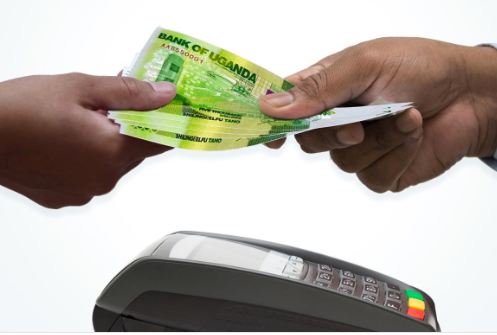The head of Uganda Bankers Association, Wilbrod Humphreys Owor has explained that with the launch of the “Shared Agent Baking System,” the bankers’ body had continued to set standards catering to the needs of traders and artisans at different locations across the country.
Owor said the new service was aimed at giving the unbanked, especially in the rural areas, the opportunity to enjoy financial services without the risk and stress of walking kilometres in order to visit a bank branch in an effort to grow deposits and customer base.
This will reduce transaction costs in the industry and will have 5800 agents country wide with over 8000 full time jobs, Wednesday morning revealed Owor while addressing media at UBA’s Muyenga-based offices.
The Bankers association is working with a number of partners, including mobile telecom companies, most of whose Mobile Money agents will be providing the services.
Mr. Arthur Isiko, the Bank of Africa Managing Director old journalists that the Agent Banking project will establish a country wide inter-operable agent network and agent banking platform that connects all Uganda Bankers Association member banks across the country for promote financial inclusion.
He explained that agents, typically small shop owners such as pharmacies or grocery stores, will be able to offer many of the common services currently provided at bank branches such as balance inquiries, cash withdrawals and cash deposits.
Mr. Isiko expressed optimism that the new service will go a long way in enhancing financial inclusion in the country with customers being be able to access these services using their smart phones, smart cards, and through other non-card systems.
The approach is meant to enable all agents provide agent banking services to customers of any of the UBA member banks while the individual banks drive the recruitment of customers and marketing of their own products and services.
The launch of a Shared Agent Bank System (SABS) follows the coming into force of the Financial Institutions Act amendments of 2016 that gave the Bank of Uganda powers in consultation with the Minister of Finance to make regulations in respect of agents and agent banking.
The platform was approved by the Central Bank on the 28th of December 2017 for members of the Association to conduct agent banking business. UBA had in preparation signed a partnership agreement with Eclectics International, a technology firm to implement the Agent Banking approach through a shared platform and agent network management.
“The financial inclusion strategy that is spearheaded by Bank of Uganda and Ministry of Finance has seen a rapid increase in transactions to the extent that as we speak, there are more mobile money transactions than Electronic funds transfer payments” said Dr. Louis Kasekende, Deputy Governor of the Central Bank.
Mr. Philip Otim, Marketing Manager Equity Bank Uganda LTD in an interview with TheUgandan explained that agent banking model works in such a way that a commercial bank appoints a third party (agent) to transact business on its behalf instead of visiting a nearby ATM or branch. The agent could be a petrol station, retail or hardware shop, a supermarket, pharmacy, and consumer goods distributors.
Going forward, Anthony Kituuka, Equity Bank’s Executive Director, said in a tweet with the rollout of its agent banking which comes with cash deposits and withdrawals, account opening initiation, school fees payment, their bank welcomes more players in this space who will enhance sensitization of the market on how agency banking can push financial inclusion and that is good for the economy and the country.

Currently, Equity Bank and Centenary Bank have the widest agent banking as a pilot with 1,200 and 400, agents respectively.
In the East African Community, Kenya and Rwanda has already been successfully introduced, proving thousands of low-level income households access to financial services. Data from Central Bank of Kenya shows that agent banking that was started in 2010 with the main objective being improving financial inclusion witnessed a rise of 56 million transactions in the first-quarter of 2016 compared to 10 million transactions noted in the same period in 2015.












